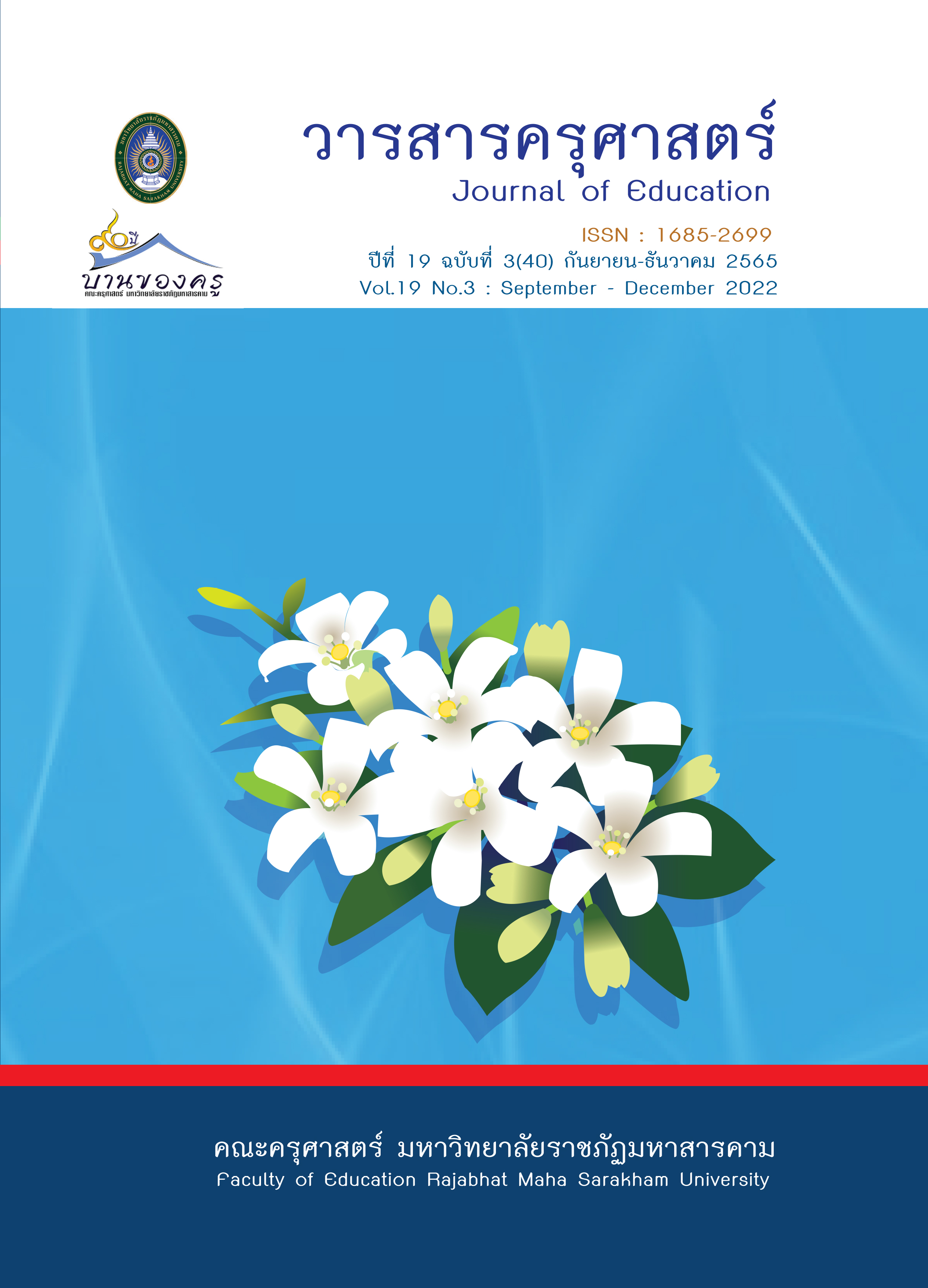The Using Result of the Online Project-Based Learning with Student Engagement Technique Model for Vocational Student
Main Article Content
Abstract
This research aimed to 1) develop of online lessons based on the learning model as the effective Meguigan's criterion 2) compare the students’ achievement test score between the students who study with the model and students who study in classroom, 3) study students learning collaboration with a learning model, and 4) study the students satisfaction toward the learning model. The sample for this research consisted of the High Vocational Certificate 1 group 11 and group 12 students, Computer Business Major, Buriram Technical College. Second semester, academic year of 2016. The sample used the cluster random sampling. The research instruments were 1) online PBL lessons and the learning technique 2) an achievement test 3) a collaboration evaluation form and 4) a satisfaction form. This research uses an experimental research method. The statistics used mean, standard deviation, Meguigan’s efficiency criterion and t-test.
The result of the research found that 1) the efficiency of the online lessons model was 1.09, which was higher than the Meguigans’s criterion. 2) the sample and the experimental group achievement scores were statistical significance differences at .01 level. 3) the result of students collaboration evaluation revealed at high level and 4) the students’ satisfaction was also at high level.
Article Details

This work is licensed under a Creative Commons Attribution-NonCommercial-NoDerivatives 4.0 International License.
ข้อกำหนดเบื้องต้นที่ผู้นิพนธ์(ผู้ส่งบทความ) ควรทราบ
1. ผู้นิพนธ์ที่ประสงค์จะลงตีพิมพ์บทความกับวารสาร ตั้งแต่เดือนมกราคม 2563 เป็นต้นไป ให้ใช้รูปแบบใหม่ (Template 2563) โดยสามารถดูตัวอย่างได้ที่เมนู GUIDELINES
2. จะตีพิมพ์และเผยแพร่ได้ ต้องผ่านการประเมินจากผู้ทรงคุณวุฒิ (Peer Review)
3. การประเมินบทความโดยผู้ทรงคุณวุฒิ (Peer Review) เป็นแบบ Double Blind
4. การอ้างอิงบทความใช้หลักเกณฑ์ APA (American Psychological Association) คลิก
5. บทความถูกปฏิเสธการตีพิมพ์ ไม่ผ่านการประเมิน ผู้นิพนธ์ขอยกเลิกเองหรือชำระเงินก่อนได้รับการอนุมัติ ทางวารสารไม่มีนโยบายการคืนเงิน
References
จิรพงษ์ โลพิศ. (2550). การจัดการเรียนรู้วิชางานระบบควบคุมเครื่องยนต์ด้วยอิเล็กทรอนิกส์ตามหลักสูตรฐาน
สมรรถนะ. [วิทยานิพนธ์มหาบัณฑิต ไม่ได้ตีพิมพ์]. มหาวิทยาลัยเทคโนโลยีพระจอมเกล้าธนบุรี.
นภารัตน์ ชูเกิด. (2554). การวิเคราะห์ความสัมพันธ์ของความผูกพันของผู้เรียนการยอมรับเทคโนโลยีและผลสัมฤทธิ์
ทางการเรียนโดยใช้เว็บเป็นฐานการสอน. [วิทยานิพนธ์ปรัชญาดุษฎีบัณฑิต ไม่ได้ตีพิมพ์]. มหาวิทยาลัย
เทคโนโลยีพระจอมเกล้าพระนครเหนือ.
มนต์ชัย เทียนทอง. (2555). ระเบียบวิธีวิจัยทางคอมพิวเตอร์ศึกษา Research Methodology in Computer Education
(พิมพ์ครั้งที่ 2). สาบันเทคนลยีพระจอมเกล้าพระนครเหนือ.
รังสรรค์ ทบวอ. (2562) การพัฒนารูปแบบการเรียนรู้แบบโครงงานออนไลน์ ที่มีการส่งเสริม การเรียนรู้ด้วยเทคนิค
ความผูกพันของผู้เรียน สำหรับผู้เรียนอาชีวศึกษา. วารสารศึกษาศาสตร์ มหาวิทยาลัยมหาสารคาม,
(3), 183-194.
วิจารณ์ พานิช. (2556). สนุกกับการเรียนในศตวรรษที่ 21 (พิมพ์ครั้งที่ 1). มูลนิธิสดศรีสฤษดิ์วงศ์.
วิทยากร เชียงกูล. (2556). ปฏิรูปประเทศไทย: รายงานสภาวะการศึกษาไทย 2554-2555. กรุงเทพธุรกิจ.
สำนักงานคณะกรรมการพัฒนาการเศรษฐกิจและสังคมแห่งชาติ. (2554). แผนพัฒนาเศรษฐกิจและสังคมแห่งชาติ
ฉบับที่ 11 (พ.ศ. 2555 - 2559). สำนักนายกรัฐมนตรี.
สำนักงานเลขาธิการสภาการศึกษา. (2548). รายงานการวิจัย เส้นทางการศึกษาด้านอาชีวศึกษาและ เทคโนโลยี
(พิมพ์ครั้งที่ 1). สำนักงานเลขาธิการสภา การศึกษากระทรวงศึกษาธิการ.
สำนักงานเลขาธิการสภาการศึกษา. (2553). การศึกษาความต้องการกำลังคนเพื่อวางแผนการผลิตและพัฒนา
กำลังคนของประเทศ (พิมพ์ครั้งที่ 1). สำนักงานเลขาธิการสภา การศึกษากระทรวงศึกษาธิการ.
สำนักงานเลขาธิการสภาการศึกษา. (2554). ยุทธศาสตร์การผลิตและพัฒนากำลังคนของประเทศในช่วงการปฏิรูป
การศึกษาในทศวรรษที่สอง พ.ศ. 2552-2561 (พิมพ์ครั้งที่ 1). สำนักงานเลขาธิการสภา การศึกษา
กระทรวงศึกษาธิการ.
สำนักงานเลขาธิการสภาการศึกษา. (2555). แผนแม่บทเทคโนโลยีสารสนเทศและการสื่อสาร ของสำนักงาน
เลขาธิการสภาการศึกษา (พ.ศ. 2555-2558) (พิมพ์ครั้งที่ 1). สำนักงานเลขาธิการสภา การศึกษา
กระทรวงศึกษาธิการ.
สำนักมาตรฐานการอาชีวศึกษาและวิชาชีพ. (2551). แนวทางการจัดการศึกษา ตามมาตรา 8 พระราชบัญญัติการ
อาชีวศึกษา พ.ศ. 2551. สำนักงานคณะกรรมการการอาชีวศึกษา กระทรวงศึกษาธิการ.
เสาวนีย์ สิกขาบัณฑิต. (2528). เทคโนโลยีทางการศึกษา. สถาบันเทคโนโลยีพระจอมเกล้าพระนครเหนือ.
Ching, Y. H., & Hsu, Y. C. (2013). Peer Feedback to Facilitate Project-Based Learning in an Online Environment.
International Review of Research in Open and Distance Learning, v14(5), 258-276.
Miller, M. B. (2013) Engagement in an online course: The students' viewpoint. [Unpublished doctoral
dissertation]. The University of Nebraska–Lincoln.
Sawyer, G. L. (2013) The Effects of Traditional Teaching Methods, Project-Based Learning, and a Blended
Teaching Style on Elementary Students. [Unpublished doctoral dissertation]. Trevecca Nazarene
University.
Warren, A. M. O. (2014) A study of online Project-Based Learning with Gambassa: Crossroads of informal
contracting and Cloud Management Systems. [Unpublished doctoral dissertation]. University of
Southern California.


